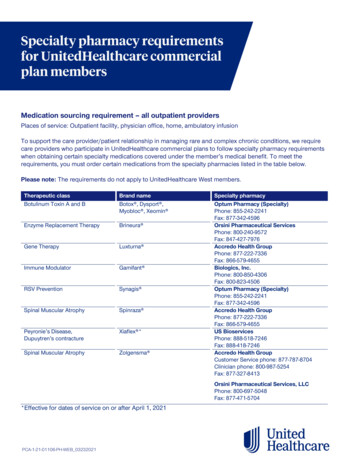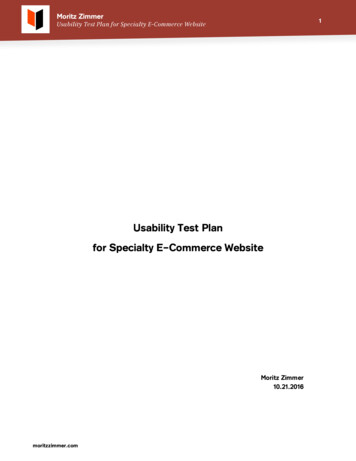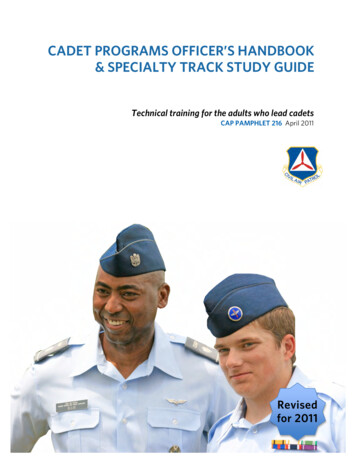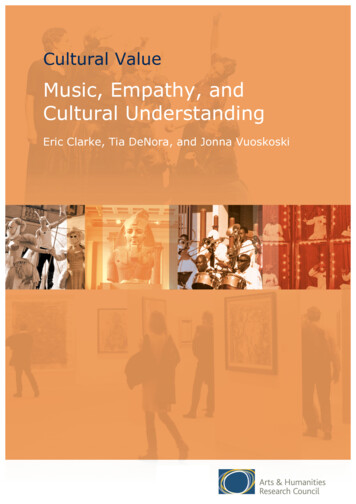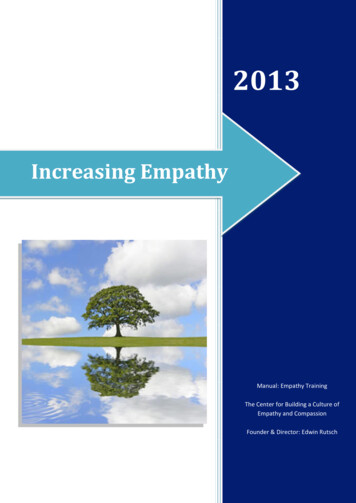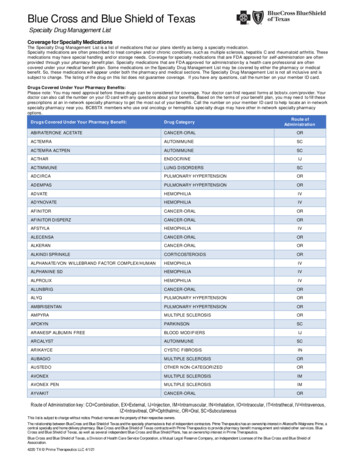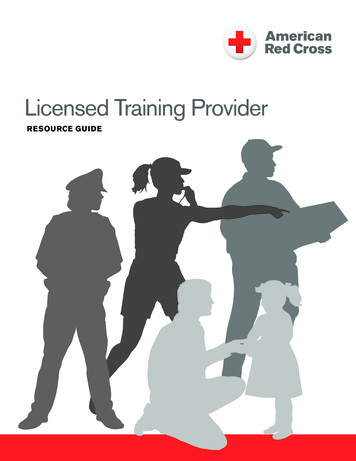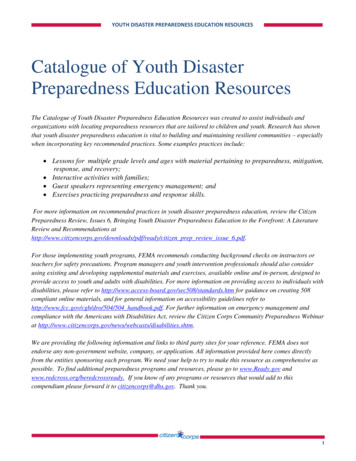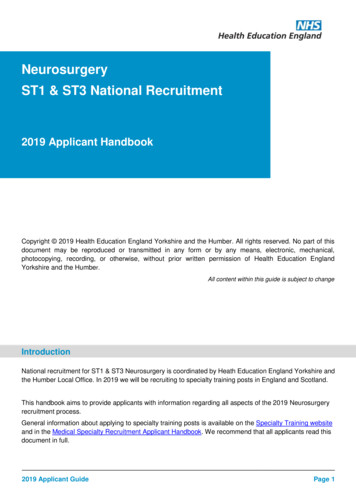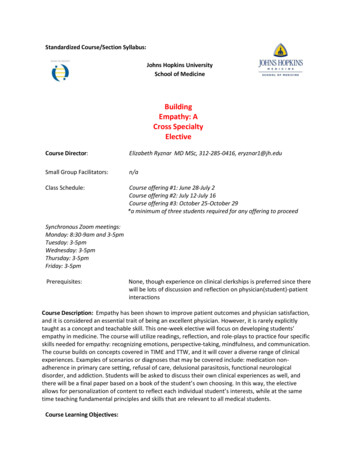
Transcription
Standardized Course/Section Syllabus:Johns Hopkins UniversitySchool of MedicineBuildingEmpathy: ACross SpecialtyElectiveCourse Director:Elizabeth Ryznar MD MSc, 312-285-0416, eryznar1@jh.eduSmall Group Facilitators:n/aClass Schedule:Course offering #1: June 28-July 2Course offering #2: July 12-July 16Course offering #3: October 25-October 29*a minimum of three students required for any offering to proceedSynchronous Zoom meetings:Monday: 8:30-9am and 3-5pmTuesday: 3-5pmWednesday: 3-5pmThursday: 3-5pmFriday: 3-5pmPrerequisites:None, though experience on clinical clerkships is preferred since therewill be lots of discussion and reflection on physician(student)-patientinteractionsCourse Description: Empathy has been shown to improve patient outcomes and physician satisfaction,and it is considered an essential trait of being an excellent physician. However, it is rarely explicitlytaught as a concept and teachable skill. This one-week elective will focus on developing students’empathy in medicine. The course will utilize readings, reflection, and role-plays to practice four specificskills needed for empathy: recognizing emotions, perspective-taking, mindfulness, and communication.The course builds on concepts covered in TIME and TTW, and it will cover a diverse range of clinicalexperiences. Examples of scenarios or diagnoses that may be covered include: medication nonadherence in primary care setting, refusal of care, delusional parasitosis, functional neurologicaldisorder, and addiction. Students will be asked to discuss their own clinical experiences as well, andthere will be a final paper based on a book of the student’s own choosing. In this way, the electiveallows for personalization of content to reflect each individual student’s interests, while at the sametime teaching fundamental principles and skills that are relevant to all medical students.Course Learning Objectives:
At the end of this course, students will be able to:1) Define empathy and its modulating factors2) Appreciate the beneficial effects of empathy on health outcomes3) Practice perspective-taking and mindfulness, which enhance one’s own ability to empathize withpatients4) Recognize factors that limit one’s own ability to empathize with patients, including transference andcountertransferance5) Reflect on past encounters with patients that may have challenged your empathic stanceRequired Text and Other Materials- Articles and videos links will be provided to students- Subscription to Calm app (free with jh email address: 3313-Calm-for-Johns-Hopkins-University- Students will be required to read one book (chosen from the list below), which they may have topurchase if it is not freely available as e-book through library or internet. Please contact coursedirector if you are having trouble. You may also suggest your own book, subject to coursedirector’s approval. Some of these are movies that are available online. You can choose the movieversion subject to course director’s approval.Structural Determinants of Health or Systems Issues or Vulnerable Populations- Ask Me Why I Hurt: The Kids Nobody Wants and the Doctor Who Heals Them (RandyChristensen)- Doing Harm: The Truth About How Bad Medicine and Lazy Science Leave Women Dismissed,Misdiagnosed, and Sick (Maya Dusenbery)- Dreamland: The True Tale of America’s Opiate Epidemic (Sam Quinones)- Evicted: Poverty and Profit in the American City (Matthew Desmond)- Heavy: An American Memoir (Kiese Laymon) obesity, race, ACEs- The Other Wes Moore: One Name, Two Fates (Wes Moore)- Your Heart is the Size of Your Fist: A Doctor Reflects on Ten Years at a Refugee Clinic (MartinaScholtens)Addiction Memoirs- Beautiful Boy: A Father’s Journey Through His Son’s Addiction (David Sheff)- Hooked: Five Addicts Challenge Our Misguided Rehab System (Lonny Shavelson) *not amemoir- In Pain: A bioethicist’s personal struggle with opioids (Travis Rieder)- Long Walk Out of the Woods: A Physician’s Story of Addiction, Depression, Hope, &Recovery(Adam Hill)- Tweak: Growing Up on Methamphetamines (Nic Sheff)Medical Memoirs:- Everything Happens for a Reason: And Other Lies I’ve Loved (Kate Bowler) cancer- In Shock: My Journey from Death to Recovery and the Redemptive Power of Hope (RanaAwdish) critical illness (ICU)- When Breath Becomes Air (Paul Kalanithi) cancer
-The Undying: Pain, Vulnerability, Mortality, Medicine, Art, Time, Dreams, Data, Exhaustion,Cancer, and Care (Anne Boyer) cancerThe Unwinding of the Miracle (Julie Yip-Williams) cancerNeurological Memoirs- Brain On Fire (Susannah Cahalan) autoimmune encephalitis- The Diving Bell and the Butterfly (Jean-Dominique Bauby) locked in syndrome- My Stroke of Insight (Jill Taylor) strokePsychiatry and/or Psychology Memoirs:- Brain on Fire: My Month of Madness (Susannah Cahalan) psychosis/autoimmune encephalitis- Building a Life Worth Living: A Memoir (Marsha Linehan) borderline personality disorder- The Center Cannot Hold: My Journey Through Madness (Elyn Saks) schizophrenia- The Noonday Demon: An Atlas of Depression (Andrew Solomon)- Manic: A Memoir (Terri Cheney)- Marbles: Mania, Depression, Michelangelo, and Me (Ellen Forney) *graphic novel- Maybe You Should Talk to Somebody (Lori Gottlieb) human struggles, psychotherapy- My Lovely Wife in the Psych Ward: A Memoir (Marck Lukach) delusions, marriage- Rx: A Graphic Memoir (Rachel Lindsay) bipolar disorder *graphic novel- An Unquiet Mind: A Memoir of Moods and Madness (Kay Redfield Jamison) bipolar disorder- Wasted: A Memoir of Anorexia and Bulemia (Marya Hornbacher)AssignmentsAsynchronous readings, videos, and reflective writing exercise ( 2 hours per day)a 1000 word reflective book report based on book from list below (or another with course director’sapproval) (6-12 hours total)Meditation (10-15 minutes per day)Evaluation and GradingA. Formative: Students will receive individual feedback from the course director mid-courseregarding participation in class activities and group presentationsB. Summative:Class participation: (50%) Reflective exercises: (25%)Reflective book report (25%)Pass/Fail Grading Scale (Grading scale is determined by the School of Medicine.)P Student has an average equal to or exceeding 70% and/or has met all required assignments for theclass.F Student has failed significant required elements of the course, or has an average score below thepassing level for the course. Student should meet with the course director to plan remediation.
ExpectationsParticipation in lectures, discussions, and other activities is an essential part of the instructionalprocess. Students are expected to participate regularly; those who are compelled to miss classmeetings should inform their instructors of the reasons for absences. Classroom participation andattendance are included in student grading and evaluation. The instructor will clearly communicateexpectations and grading policy in the course syllabus.Professional Behavior Expectations during all CoursesStudents are expected to demonstrate professional behaviors as outlined in the JHU SOM Honor Code and in theAAMC subcompetencies on professionalism:1. Demonstrate behaviors that show compassion, integrity, and respect for others2. Demonstrate behaviors that show responsiveness to patient needs that supersedes self-interest3. Demonstrate behaviors that show respect for patient privacy and autonomy4. Demonstrate behaviors that show accountability to self, patients, colleagues, the profession, and society. [Link toAccountability Policy ]Course and Clerkship directors will communicate discipline specific expectations/tasks for which students will beheld accountable. As with other Course/Clerkship domains such as knowledge and skills, students who deviatefrom these expectations, may have their final grade lowered, or a serious deviation may result in failure of thecourse/clerkship.Serious breaches of professionalism should be expected to result in failure of the course/clerkship in which thebreach is detected. These breaches will be handled on a case-by-case basis by the course/clerkship director inconsultation with the Office of Medical Student Affairs and the Office of Curriculum. All such matters may also bereferred to the Disciplinary Committee.Examples of such unprofessional behaviors include but are not limited to: cheating, plagiarism, or other forms ofacademic dishonesty; forgery or falsification of documents/records; lying or misrepresentation of facts, figures, orclinical data; failure to obtain appropriate supervision for clinical care; physical violence, bullying or harassmentagainst others, or other significant lapses in personal ethical conduct that raise concern regarding the moralcharacter of the student in question.JHUSOM Policy on AttendanceThis course is heavily dependent on participation, if you need to miss a required session, you need to letthe course leader and course coordinator know ahead of time. The JHUSOM policy on attendance in thecurriculum is posted at 8/policy 39178.pdf.Classroom Accommodations for Students with DisabilitiesIf you are a student with a documented disability who requires an academic adjustment, auxiliary aid or othersimilar accommodations, please contact the Office of Student Affairs at 410-955-3416. You must also notifythe course director and course coordinator in advance of the start of the course and well in advance of any examor assessment so that appropriate preparations can be completed before an event requiring accommodation.Statement of Diversity and InclusionJohns Hopkins University is a community committed to sharing values of diversity and inclusion in order to achieveand sustain excellence. We believe excellence is best promoted by being a diverse group of students, faculty, andstaff who are committed to creating a climate of mutual respect that is supportive of one another’s success.Teacher Learner Conduct PolicyThe Johns Hopkins University School of Medicine is committed to fostering an environment that promotesacademic and professional success in learners and teachers at all levels. The achievement of such success is
dependent on an environment free of behaviors, which can undermine the important missions of ourinstitution. An atmosphere of mutual respect, collegiality, fairness, and trust is essential. Students should reviewthe JHUSOM Guidelines for Conduct in Teacher/Learner cies/886/39186/policy 39186.pdf.Student Honor CodeStudents are reminded of the honor code developed by the medical student body, introduced in September1991, is as follows:As a student at The Johns Hopkins School of Medicine, I pledge: To do my own work and be honest in my interactions with peers, faculty, and staff. This applies tomy work on examinations, assignments, and papers as well as work in the laboratory. To uphold the high standard of conduct in patient care which has always been maintained by theJohns Hopkins medical community. To base my interactions with other students on mutual respect and cooperation. To act on infractions of the honor code and to maintain the confidentiality of all parties involved. To encourage my peers to uphold this honor code.It is the expectation that Hopkins students live by this code.Course EvaluationPlease remember to complete the course evaluation for this course. For preclerkship courses,evaluations will be required from a rotating sample of 25% of the class. Other students will always havethe option of submitting an evaluation if they choose. This will reduce the overall burden of surveys forstudents. There will be no extra credit for completing the evaluation. If you are in the designated 25%,you will receive an incomplete if the course evaluation is not completed by the time grades are postedfor the course.Course evaluations are an important tool in the School of Medicine’s ongoing efforts to improveinstructional quality and strengthen its programs. The results of the course evaluations are keptanonymous — your instructor will only receive aggregated data and comments for the entire class.For the clinical clerkships and clinical electives, 100% of the students are expected to complete thecourse evaluations.
- The Diving Bell and the Butterfly (Jean-Dominique Bauby) locked in syndrome - My Stroke of Insight (Jill Taylor) stroke Psychiatry and/or Psychology Memoirs: - Brain on Fire: My Month of Madness (Susannah Cahalan) psychosis/autoimmune encephalitis - Building a Life Worth Living:
